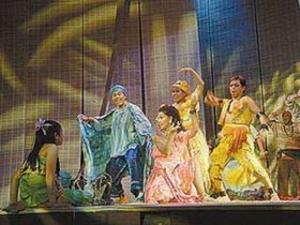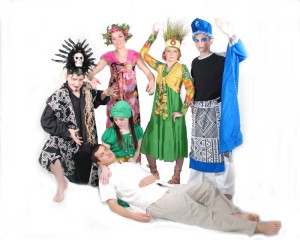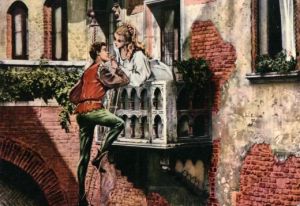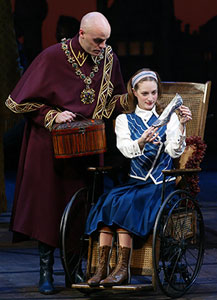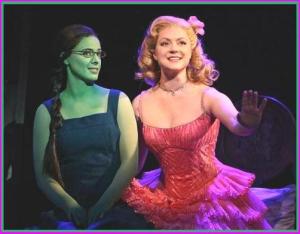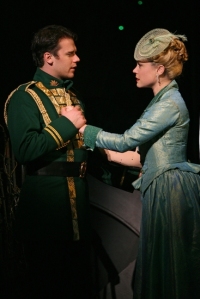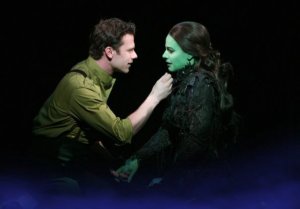For this post, I’m going to divert slightly from focuses solely on relationships (that will be discussed in Wicked Part II) Wicked is such a complex and interesting musical, that it has many messages that are interesting to explore-including issues of being different, racism, power, class and political struggles, and it has many allusions to problems in our current every day life.
Wicked asks very important questions:
- Are people born wicked or do they have wickedness thrust upon them? (relates to the second question) I believe this question refers to are people born with greed, deceptive, power-hungry, and mean natures or is that “wickedness” learned by their surroundings and life-style.)
- People depending on history’s take and outcome-people can be portrayed very differently how altered is history from the true events and will we ever really know them? (This musical can be greatly combined with Bell Hooks’ philosophy of White Supremacist Capatalist Patriarchy-which I may discuss as well)
- Are appearances more valued than talent and intelligence? -More importantly, can you get through life if you are ‘popular’?
- Are government officials just out for their own gains-do they make the world seem more exciting rather than deal with pertinent issues?
- There are more questions that I will probably think of as I write this, so I will come back to this-
Wicked has a complex storyline, so I will summarize the basics- (summary taken from Wicked Play Bill, Wicked Grimeirie, and the show’s website)
Wicked opens with a map of the Land of Oz and the Clock of the Time Dragon coming to life. It’s quite an amazing technical experience

Wicked Stage
Wicked is a musical with music and lyrics by Stephen Schwartz and a book by Winnie Holzman. It is based on the Gregory Maguire novel Wicked: The Life and Times of the Wicked Witch of the West (1995), a parallel novel of the 1939 film The Wizard of Oz and L. Frank Baum’s classic story The Wonderful Wizard of Oz (1900).
*Bold are important important points- ***THERE ARE SPOILERS****
Act I
While the citizens of Oz celebrate the death of the Wicked Witch of the West, Glinda descends onto the stage in her bubble to confirm the circumstances of the Witch’s melting.

Glinda in her bubble
She starts telling the story of Elphaba. Elphaba was conceived during an affair between the erstwhile Munchkin Governor’s wife and a mysterious stranger with a bottle of green elixir. Everyone was repulsed by Elphaba from birth, so Glinda asks the Ozians to empathize (“No One Mourns the Wicked”). The remainder of the plot forms an extended flashback through the events of Glinda’s and Elphaba’s lives.
At Shiz University, Elphaba is hardly surprised that all the students, including the popular but shallow Glinda (then Galinda), are repulsed her (“Dear Old Shiz”). The only reason that Elphaba is sent to Shiz is to take care of her beautiful, wheelchair-bound younger half-sister Nessarose, who is presented with a bejeweled pair of Silver Shoes, being her father’s favorite.

Glinda and Elphaba become roomates
Despite Elphaba and Galinda’s instant mutual loathing, Madame Morrible, Shiz’s headmistress, makes them roommates. Elphaba had been excluded from Madame Morrible’s Sorcery Seminar, but when Elphaba reveals an innate magical talent in sudden anger, Morrible notes that her talents may be of use to the Wizard of Oz.
Elphaba dreams of what she and the Wizard could accomplish together (“The Wizard and I”). Galinda and Elphaba later write home about their unfortunate room-mate assignments (“What is this Feeling?”). The students gather in a history class taught by Doctor Dillamond, a Goat and Shiz’s only Animal professor, who keeps mispronouncing Galinda’s name as “Glinda”.

After dismissing the class upon the discovery of an anti-Animal slogan on the blackboard, Doctor Dillamond confides in Elphaba that something is causing the Animals of Oz to lose their powers of speech (“Something Bad”). Elphaba believes that the Wizard is the only one who can help.
An unlikely friendship develops between Galinda (right) and Elphaba (left)

Elphaba and Glinda
Fiyero, a Winkie prince, then arrives at Shiz and immediately impresses his own brand of mindless, cavalier and carefree living on the students (“Dancing Through Life”).

Fiyero and Elphaba
Besotted with Galinda, a Munchkin named Boq asks her to accompany him to a party at the Ozdust Ballroom, but having felt “perfect together” with Fiyero, Galinda asks him to invite Nessarose instead. Nessarose, not realising Galinda’s real motives for getting Boq to ask her out, is delighted, and tells Elphaba that she wishes she could repay Galinda somehow. Later, Galinda discovers a black pointed hat in a box and gives it to Elphaba as a mock present.
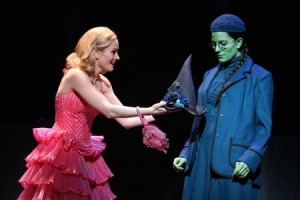
Black is this year's pink!
Elphaba, remembering how happy Galinda had made Nessarose (and too not realising that she had ulterior motives), asks Madame Morrible to reconsider Galinda in her Sorcery Seminar, in return. When, however, Elphaba arrives to the party wearing the hat, she is only ridiculed. Defiant, she proceeds to dance alone without musical accompaniment. Feeling guilty, Galinda joins her, marking the start of their friendship. Meanwhile, Boq convinces Nessarose that it was not pity that prompted him to ask her out, but the fact that she is “so beautiful”, not realizing the full extent of Nessarose’s affections towards him.

Boq and Nessa
Back in their dorm, Elphaba tells Galinda that her mother had been fed milk-flowers to prevent her second child from being born green-skinned; the milk-flowers instead caused Nessarose to be born prematurely, which left her crippled whilst her mother died in childbirth. Feeling sympathetic, Galinda decides to give Elphaba a personality makeover, making her admirable to fellow students (“Popular”).

Elphaba look at you, you're beautiful
The next day, Doctor Dillamond is abruptly taken away by Ozian officials. The new history teacher arrives with a caged lion cub as the subject of an in-class experiment, revealing that Animals are to be kept in a new invention he has created (cages), which removes their power of speech. He reveals that soon all Animals will be turned dumb, and Elphaba is outraged. She and Fiyero steal the cub and set it free, and as Elphaba begins to discover romantic feelings towards Fiyero, she personally reafirms that she “wasn’t born” to be loved (“I’m Not that Girl”).
Madame Morrible finds her, announcing that Elphaba has been granted an audience with the Wizard in the Emerald City. At the train station, Galinda, Fiyero, Nessarose and Boq see Elphaba off, all happy for her accomplishment. When it becomes apparent that Boq is not genuinely interested in Nessarose, Glinda feels guilty and suggests that Boq is not the right person for Nessarose, who in turn insists that it is herself “that’s not right.” Elphaba expresses concern about leaving her younger sister, but a protesting Nessarose insists she will manage without her and leaves. In an attempt to impress Fiyero, Galinda announces that she will change her name to “Glinda” in honor of Doctor Dillamond’s persistent mispronunciation. Fiyero fails to notice and leaves. Glinda breaks into tears.Elphaba invites her along to see the Wizard. After a day of bonding and sightseeing in the Emerald City (“One Short Day”),

One Short Day
Elphaba and Glinda meet the Wizard. Using the special effects he employs for the benefit of most visitors, he invites Elphaba to join him (“A Sentimental Man”). As a test, he asks that Elphaba give his monkey servant, Chistery, the ability to fly using the Grimmerie – an ancient book of spells. Elphaba demonstrates an intrinsic understanding of the lost language contained in the book, and successfully gives Chistery wings.

wizard and elphaba

Chistery with wings
The Wizard then reveals a cage full of winged monkeys, proving the extent of Elphaba’s powers, and remarks that they will make good spies to report any subversive Animal activity. Realizing that she has been used and that the fraudulent Wizard and Madame Morrible are responsible for the Animals in Oz losing their power of speech, a horrified Elphaba runs away with the Grimmerie.
Glinda goes after her, pursued by the palace guards. She runs to the tallest tower, where they hear Madame Morrible declaring to Oz that Elphaba is a “Wicked Witch” and not to be trusted. Elphaba enchants a broomstick to fly and almost convinces Glinda to join her in her cause, but Glinda cannot resist the call of popularity as one of the Wizard’s assistants, and refuses. Leaving Glinda behind and escaping the guards, Elphaba flies off towards the western sky, promising to fight the Wizard with all her power (“Defying Gravity”).
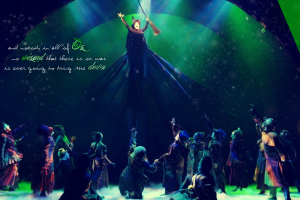
Defying Gravity
Act II
Elphaba is increasingly ostracized as the story develops, holding views opposed to the norm of her society. A few months have passed and Elphaba’s opposition of the Wizard’s regime has earned her the title “The Wicked Witch of the West” (reprise of “No One Mourns the Wicked”). Rumor has it that the witch’s soul is so impure that pure water could melt her. Glinda, now the Wizard’s assistant and adored by everyone, pronounces herself engaged to Fiyero. Informing him that he has to accept the fact that Elphaba does not want to be found, Glinda puts on a happy front despite Fiyero’s waning affections because he supports and wants to find Elphaba. (“Thank Goodness”).
Meanwhile, Elphaba arrives at her old home, the Governor’s residence in Munchkinland, seeking refuge. Nessarose is the Governor now, and laments that her father “died of shame” after Elphaba rebelliously defied the Wizard. She criticizes Elphaba for not using her new-found powers to help her own sister. Guilty, Elphaba enchants Nessarose’s jeweled shoes, turning them into the ruby slippers and enabling her to walk. Boq is summoned, and he bemoans that Nessarose is as “wicked” as Elphaba for stripping the Munchkins of their rights and prohibiting them from leaving Munchkinland. Nessarose explains that she did this to keep Boq with her, but is sure that he will stay with her of his own accord now that she is no longer crippled. However, Boq insists that he should now be free to pursue Glinda instead, going so far as to brandish a knife when his “Madame Governor” refuses to let him go.

Nessa governer
Hurt and angry, Nessarose attempts to cast a spell from the Grimmerie to make Boq lose his heart to her, however her ability to understand the Lost Language of Spells is not as good as her sister’s, and she mispronouces the magic words which causes Boq to literally lose his heart. While Elphaba attempts to save him, Nessarose reflects on how being “alone and loveless” has led to her wicked actions, and fears that she deserves her infamous new title (“The Wicked Witch of the East”). Elphaba says that nothing will ever be enough for her younger sister and leaves her for good, despite Nessarose’s frantic pleas for her sister to stay.
When Boq wakes up, he is horrified to discover that Elphaba has transformed him into a Tin Man, so he could live without a heart, and a desperate Nessarose lays the entire blame on her sister while Boq runs away in horror, believing that Elphaba has cursed him for leaving her sister.
Returning to the Wizard’s palace, Elphaba tries to free the remaining winged monkeys. The Wizard attempts to regain her favor by agreeing to set them free, recounting how the Ozians hailed him as the Wonderful Wizard when he first came to Oz in a balloon from America. He explains that she could, likewise, be hailed by everyone if she joins him (“Wonderful”). Upon discovering the now-speechless Doctor Dillamond amongst the monkeys, however, Elphaba rejects his offer. While attempting to escape, she bumps into Fiyero, who runs away with her, confirming that he loves her in return.

As long as your mine
Glinda sees this and is crestfallen that she has been betrayed by those closest to her (reprise of “I’m Not that Girl”). When Glinda states that Elphaba can be lured by spreading a rumor that Nessarose is in danger, the fiendish Madame Morrible creates a cyclone that brings Dorothy’s house to Oz and crushes Nessarose to death. While Fiyero and Elphaba express their love in a dark forest (“As Long as You’re Mine”),
Elphaba senses that her sister is in danger. Before she leaves Fiyero offers her a hiding place where she’ll be safe. She flies off to help, but is too late, arriving just as Glinda sends Dorothy and Toto off along the Yellow Brick Road. The palace guards capture Elphaba, but Fiyero intervenes, allowing Elphaba to escape before surrendering himself.
The guards take him to a nearby cornfield to be tortured until he tells them of Elphaba’s whereabouts. At her castle, Elphaba tries to cast any spell she can to save Fiyero, but thinking she has failed, she begins to accept her reputation as “wicked” (“No Good Deed”).
Dorothy, the Scarecrow, Boq – now the Tin Man – and the Cowardly Lion are sent to kill Elphaba (“March of the Witch Hunters”). It is revealed that the Cowardly Lion is the lion cub Elphaba set free; Boq claims that she turned him into a coward by not letting him fight his own battles. Meanwhile, Elphaba captures Dorothy, refusing to release her until she relinquishes Nessarose’s ruby slippers – the only things left of her dead sister. Glinda travels to Elphaba’s castle to warn her of the trouble and persuade her to let Dorothy go.

March of Witch Hunters

Although Elphaba refuses, the two women forgive each other for all grievances, acknowledging they have both made mistakes. Elphaba makes Glinda promise not to clear her name and to take charge in Oz, allowing her to disappear.
The two friends embrace for the last time before saying goodbye forever (“For Good”). Immediately after, when Dorothy throws a bucket of water on Elphaba, the witch appears to melt away. Glinda, not quite sure what has happened, sees that all that remains of her friend is her black hat and a vial of green elixir.
Back at the Emerald City, Glinda reminds the Wizard that he has an identical bottle, and it is revealed that the Wizard is Elphaba’s father, being the stranger whom her mother had an affair with. Madame Morrible surmises that Elphaba had special powers because she was a child of both Oz and the outside world. Glinda orders the Wizard to leave Oz in his balloon and sends Madame Morrible to prison, before preparing to face the citizens of Oz, returning to the opening scene of the show.
Meanwhile, Fiyero had in fact been turned into the Scarecrow when Elphaba had cast spells, therefore saving him from the Ozian guards’ spears in the cornfield. He opens a trap door in Elphaba’s castle, down which she had descended, pretending to die for the benefit of the others. While Elphaba and Fiyero leave Oz forever, Glinda continues her bittersweet celebration with the citizens of Oz. They gaze up at the sky, individually appreciating their true friendship and acknowledging that they have changed for the better because they knew each other (“Finale”).

The End!
Wow, I know that is a long musical, it is very complex as I said-but it is very good and it shows some themes and ideologies that it tries to confront that other musicals have not done.
So the fundamental question wicked asks is the first question I posed in the post:
Are people born wicked or is wickedness thrust upon them? (Is our concept of good and evil really black and white)
-Many people would argue that wickedness is thrust upon them. People aren’t born with bad natures. It is how they are raised, if they are raised in abusive households-they are more likely to develop mean-spirited natures. Whenever children first start to learn things-children usually give freely, they are generous and if not brought up in materialistic societies, children really don’t understand greed. In the original Wizard of Oz, Glinda informs Dorothy that “only bad witches are ugly”, giving children a sense of absolute good vs. absolute evil. However, Wicked challenges this concept that only “ugly” people are evil by making Elphaba the victim of a greater and more complex scheme of the Wizard and Madame Morrible- which alludes to governments that have dictators or corrupt politicians at their helm.
-Elphaba according to the musical-was never really ‘wicked’ to begin with, she had uncontrollable magical talent, but all the things she did when she does learn how to use her powers, are done with good intentions. Elphaba is given the name “Wicked Witch of the West” because she becomes an advocate for Animal rights-since Animals are becoming a suppressed class in Oz for the Wizard to assert greater control and fear over the citizens of Oz. When she rebels and tries to expose the wizard for what he is, Madame Morrible and the Wizard spread fear and lies to estrange her from all possible help she could have done for her cause.
People depending on history’s take and outcome-people can be portrayed very differently how altered is history from the true events and will we ever really know the truth of events?
– This is a very daring concept to have in a predominately white audience show. Most people are not aware how “white-washed” history has become. At times I almost argue to people that learning what we call ‘history’ is not really relevant to now because so much of it is easily twisted or glorified. This concept in the show gets presented during the song wonderful and it asks the audience to consider people in history who might not have been their labels: traitor or liberator, a philanthropist or a cheat, a crusader or ruthless invader- the wizard sums up the societal values very well with the line “it’s all in which label is able to persist”. It does give one thought to think are any of us like Elphaba in the sense that our cause is deemed Wicked just because the government or society does not agree with it? It is very possible. It sometimes sickens me to think that people don’t realize how accurate the situation Wicked portrays is gratified in our own society. People are more than willing to be disillusioned because it’s easier to believe in something false rather than expose the truth.
Are appearances more valued than talent and intelligence? -More importantly, can you get through life if you are ‘popular’?
In one of the first scenes of the show we are introduced to some concepts of beauty. We see Nessarose, Elphaba’s sister as “tragically beautiful” because though she is very beautiful, she was crippled and forced to be kept in a chair all of her life. While we hear Elphaba refer to herself as “beautifully tragic”. Glinda is obviously seen as very beautiful however, she is seen as very ditsy and selfish. She feels that her beauty surpasses all that of Oz and that she deserves the very best due to her beauty. Glinda is seen as very funny but also ditsy and lacking intelligence due to the silly words she invents for things and the way she mispronounces everything. Nessarose however, does contradict Glinda and Elphaba’s status. Nessarose both represents women that have disabilities and can be beautiful and succeed because of them, and those women-who despite their beauty and talent-are corrupted by power. She is a stark contrast to Glinda who is the classic girl that gets everything that she wants, she follows the mainstream of society, and in the end, while Elphaba and Fyiero are forced to leave Oz, Glinda still is very much a recognized figure in Oz and though she does give the full story of Elphaba’s life, it does not seem that much changes in Oz and Glinda is not powerful enough to really make significant change in Oz. In terms of this, Wicked does not help break stereotypes, but at the same time, we do see change in Glinda-we see her evolve into this very empathetic person and she wants to bring about a change in the corruption of Oz-that’s why she sends away the Wizard and arrests Madame Morrible, however, I just wish there would have been a bigger triumph or that Elphaba’s cause wouldn’t have been totally lost on Oz.
Are government officials just out for their own gains-do they create distractions from the real issues to avoid dealing with them?
-In many ways Wicked takes the concept of the Emerald city even further, that the Emerald city only exists due to the “rose-colored glasses” idea, but in this case they are green, without them, the world is the black and white and it would be much easier to actually see real issues without them, but as it is, society is blinded by entertainment and what they see in their eyes as “great” accomplishments from their ruler-the Wizard. The Wizard in Wicked is really a “liar and a cheat” he has no power but what he and Madame Morrible create through deception, fear, and rumors. I feel as though a great many governments, if not government officals opperate on this front, and it’s difficult to say how easily these issues could be spotted.
Relatable to 2012?
In many ways, I feel that Wicked relates to our society today. We can all be branded as enemies if we fight for the causes we believe in, if we do not get the support of governments and society. It really leads one to consider the construction of modern society and if there is hope for change in the world and the way that people think, feel, and react to ideas of racism, class, and power. Until these things change-we are all victims of the society we are born into.
-Lydia Stedeford
 Summary of Once on this Island:
Summary of Once on this Island:
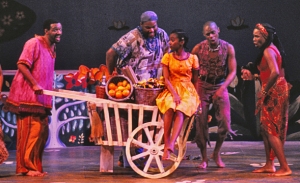 She journeys to his city and finds him and heals him. The story tellers tell of the story of the Boshomes-how Armand who was the leader of a French Inquisition-his son and the peasants fought for the island and won. Armand left a curse on the Boshomes and the reason that the Boshomes hate the peasants are despised is that they remind the Boshomes where they are from. Daniel and Ti Moune become lovers and then there is the Grand Ball at the Hotel Boshome and Daniel introduces Ti Moun to Andrea. Ti Moun dances for the ball and Andrea reveals that her and Daniel are to be married. Daniel confirms that Andrea and himself have been promised since they were children. Ti Moun gets upset that she loves him and she can never have the life she thought they were going to have while Daniel’s only defense is he thought she understood they could never marry.
She journeys to his city and finds him and heals him. The story tellers tell of the story of the Boshomes-how Armand who was the leader of a French Inquisition-his son and the peasants fought for the island and won. Armand left a curse on the Boshomes and the reason that the Boshomes hate the peasants are despised is that they remind the Boshomes where they are from. Daniel and Ti Moune become lovers and then there is the Grand Ball at the Hotel Boshome and Daniel introduces Ti Moun to Andrea. Ti Moun dances for the ball and Andrea reveals that her and Daniel are to be married. Daniel confirms that Andrea and himself have been promised since they were children. Ti Moun gets upset that she loves him and she can never have the life she thought they were going to have while Daniel’s only defense is he thought she understood they could never marry. 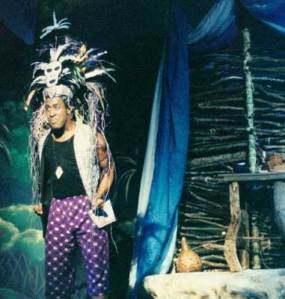 Papa Ge comes at last for Ti Moune and Ti Moune begs him to not take her life. He offers her one last chance to trade her life for his, to prove that death was stronger than love and she could have her own life again. He tells her to kill the love she has for him, and it would be as though she had never loved at all-with her own life again. She considers but Ezuli gives her courage and she cries out that she can’t bear for Daniel to die. She tells him that she loves him and due to that, she was cast out of the Hotel Boshome. She waits at the gate, hoping Daniel will come for her, but Daniel and Andrea are married and they come to the gates to give peasants coins. Ti Moun sees Daniel. Andrea calls him, he places a coin in her hand, and leaves. In despair Timoon dies and Tonton and Mama Urali find her.
Papa Ge comes at last for Ti Moune and Ti Moune begs him to not take her life. He offers her one last chance to trade her life for his, to prove that death was stronger than love and she could have her own life again. He tells her to kill the love she has for him, and it would be as though she had never loved at all-with her own life again. She considers but Ezuli gives her courage and she cries out that she can’t bear for Daniel to die. She tells him that she loves him and due to that, she was cast out of the Hotel Boshome. She waits at the gate, hoping Daniel will come for her, but Daniel and Andrea are married and they come to the gates to give peasants coins. Ti Moun sees Daniel. Andrea calls him, he places a coin in her hand, and leaves. In despair Timoon dies and Tonton and Mama Urali find her.
